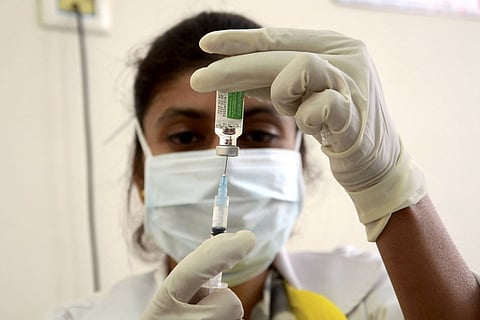

Immunity through a single dose of Covishied vaccine after a COVID-19 infection is more potent than immunity acquired by two shots of the vaccine or the infection alone, found a study conducted by the Center For Arthritis and Rheumatism Excellence (CARE) in Kerala, the Kalinga Institute of Medical Research in Odisha, and the Amrita Institute of Medical Research in Kerala. When the natural immunity of a person who has recovered from COVID-19 is boosted with one shot of the vaccine, it leads to hybrid immunity. This is sufficient to ensure a long-lasting immunity in such persons, and more importantly, it could help India save more vaccine doses, according to Dr Padmanabha Shenoy, rheumatology and medical director, CARE Hospital, Kochi.
The study headed by CARE is an ongoing process, where various aspects of the immune responses associated with COVID-19 are being analysed among 1,500 patients of the hospital. Some of these patients have been previously infected with coronavirus and/or vaccinated against the infection. The hybrid immunity is one such aspect, which was studied among 1,200 patients with autoimmune rheumatic diseases (ARD). Patients with ARD, which affects joints, bones or muscles, are known to have a low immune response to COVID-19 infection, primarily due to the underlying medical conditions.
The patients were divided into four groups with 30 patients each — Those with past COVID-19 infection but no vaccine; those who received a single dose of Covishield; those with two doses; and those with past infection and received a single dose of Covishield. Some of these patients were diagnosed with COVID-19 in October 2020. The average gap between infection and vaccination was four to five months.
The study found that the mean antibody titres (level of antibodies) in the group with hybrid immunity — natural immunity plus vaccine immunity from one dose — were at least 6-100 times higher than in the other three groups. It also showed that those with hybrid immunity had “the highest neutralisation potential of 83.37% as compared to 45.4% in the fully vaccinated group.” At 86.7%, the proportion of hybrid immunity patients, who had adequate neutralising antibodies — which defends cells from pathogens by neutralising them — was higher compared to other groups of patients.
“We had previously shown that patients with AIRD also form adequate humoral responses to COVID-19 infection equivalent to those in healthy controls (no co-morbidities). The current data shows that this can be augmented with a single dose of vaccine to produce a strong humoral (antibody-mediated) immune response. A major concern was whether a natural infection would produce specific neutralising antibodies. Hence, we tested in vitro the neutralising capacity of the sera of these patients and found that antibodies produced are those with neutralising capability,” said the study.
Since a single dose of the vaccine showed “a very high level of immunity” in post-COVID-19 patients, two doses may not be necessary for such persons, the team suggested. “This could save close to three crore vaccine doses, which can be used to help address the supply crunch that India and other parts of the country are currently facing,” said Dr Shenoy.
Several experts and studies, too, have made similar observations regarding single dose among people who have a natural immunity to COVID-19.
However, Dr Shenoy stressed that the purpose of the study was to introduce a vaccination policy change, and not to deter the vaccination drive. "If a person has vaccine-induced immunity, he/she has a certain level of immunity, which is good enough. In India, more than 60% of the population has been already infected. For such people, one dose of vaccine is enough,” he said.
To ensure this, the team suggested an antibody test prior to the vaccination. “Many COVID-19 cases are missed or go undocumented. Hence, an antibody test before vaccination will help. Vaccine centres should have antibody testing kits, which should be cheaper than the vaccine itself,” he said.
“Logically, hybrid immunity has greater longevity, but we need more studies to prove this scientifically, and especially to understand the duration of the immunity. We will be doing a follow-up antibody test after six months,” he said.
However, he stressed that funding is critical to keep such research studies running. “This was a self-funded study in Kerala. However, more philanthropists should come forward to support such studies, as resources such as testing kits are expensive,” he said.
“We often rely on the western data to formulate policies for India. However, we should have indigenous data because our vaccines are different, people and population distribution are different. Even if it is a small amount, crowdfunding will go a long way in promoting scientific research, especially since we are progressing to a stage where children are going to be vaccinated,” he added.
The team, meanwhile, is also studying the effect of Covaxin on the immune response; will there be a quantum jump in immunity if the post-COVID-19 patient gets a second dose, and if yes, by how much, among other aspects.